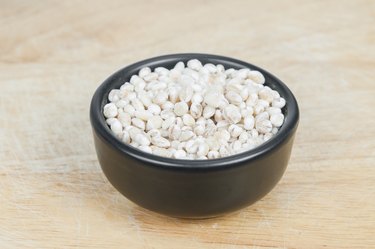
Job's Tears, also known as adlay and coix, is a member of the grass family and popular in Asian cultures as a food source and for making jewelry. But the plant has also been used for centuries in folk medicine to treat dozens of conditions from arthritis to smallpox. Scientific research investigating Job's Tears hasn't been conducted much outside China and Korea, but results from those studies are discovering properties in the plant that may have potent health benefits.
Allergies
Video of the Day
One of the traditional uses for Job's Tears is to treat allergies, including topical preparations of plant extracts for an allergic skin condition called contact dermatitis. Research published in the "Journal of Agricultural and Food Chemistry" in June 2003 found that extracts from the plant also suppressed allergic reactions in laboratory mice and boosted their immune systems.
Video of the Day
Cholesterol
Diabetic mice were fed the seeds from Job's Tears plants along with a high-cholesterol diet for four weeks in a study published in the "International Journal for Vitamin and Nutrition Research" in September 2006. Compared to a control group, the seed-eating mice had significantly reduced levels of total cholesterol and harmful low-density lipoprotein, or LDL, cholesterol.
Cancer Prevention and Treatment
Several research teams in China have studied the effects of Job's Tears on cancers of the colon, pancreas, lung, liver, breast and also leukemia, with promising results. One study, published in the "Journal of Ethnopharmacology" in September 2008, found extracts of Job's Tears significantly inhibited fatty acid synthase activity in the liver. This is important because human cancer cells contain high levels of fatty-acid synthase, a substance linked to aggressive tumor cell growth.
Endocrine Disorders
Job's Tears extracts are used to treat endocrine disorders due to the plant's ability to decrease hormones like progesterone and testosterone. In the December 2000 issue of the "Journal of Traditional Chinese Medicine," painful menstrual symptoms were reduced 90 percent, which was a much better result than a control group treated with prescription medications.
Gastrointestinal Benefits
Job's Tears may also have protective benefits for the gastrointestinal system. A June 2011 study in the "Journal of Agricultural and Food Chemistry" found that Job's Tears seeds inhibited gastric cancer cells in vitro and were also able to decrease stomach ulcers in mice.
Osteoporosis
A study published in 2008 in the "Asia Pacific Journal of Clinical Nutrition" found that Job's Tears seeds improved levels of several osteoporosis biomarkers in the blood of the mice as compared to a control group. The scientists concluded that the extracts may be capable of reversing osteoporosis in rats and could also be a helpful healthy food for osteoporosis prevention.
Weight Loss
Mice with obesity were injected with extracts from Job's Tears for four weeks in research published in 2004 in the journal "Life Sciences." Compared to a control group, the mice fed the extracts had reduced body weights, food intake, fat size, adipose fat tissue mass and levels of cholesterol and triglycerides.
Considerations
There have been few human trials of Job's Tears, and side effects are largely unknown. A 2005 study in the "Journal of Toxicology & Environmental Health" found pregnant rats fed Job's Tears experienced a higher rate of abortions and the extracts also poisoned the developing embryos. Do not use Job's Tears if you are pregnant, and check with your doctor before using extracts from the plant for any health condition.
- Purdue University Center for New Crops & Plant Products: Coix lacryma-jobi L
- “Journal of Agricultural and Food Chemistry”; Suppression of Allergic Reactions by Dehulled Adlay in Association With the Balance of Th1/Th2 Cell Responses; H.Y. Hsu, et al.; June 2003
- “International Journal for Vitamin and Nutrition Research”; Effects of Dehulled Adlay on Plasma Glucose and Lipid Concentrations in Streptozotocin-Induced Diabetic Rats Fed a Diet Enriched in Cholesterol; P.H. Yeh, et al.; September 2006
- “Journal of Ethnopharmacology”; Inhibition of Coix Seed Extract on Fatty Acid Synthase, a Novel Target for Anticancer Activity; F. Yu; September 2008
- “Journal of Traditional Chinese Medicine”; The Analgesic Action of Semen Coicis on Severe Functional Dysmenorrhea--a Sequential Trial Observation; Y. Zhang, et al.; December 2000
- “Journal of Agricultural and Food Chemistry”; Gastroprotective Activities of Adlay on the Growth of the Stomach Cancer AGS Cell Line and Indomethacin-Induced Gastric Ulcers; C.P. Chung, et al.; June 2011
- “Asia Pacific Journal of Clinical Nutrition”; Osteoporosis Prevention by Adlay; R.S. Yang; 2008
- “Life Sciences”; Hypolipidemic Effects Of Crude Extract of Adlay Seed in Obesity; S.O. Kim; 2004
- “Journal of Toxicology & Environmental Health”; Abortifacient from Seeds of Coix; HP Tzeng; 2005
- Institute for Traditional Medicine; Coix: Food and Medicine; Subhuti Dharmananda, Ph.D.